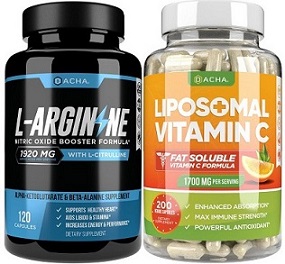Long COVID: Italian Randomized Clinical Trial Shows That L-Arginine Plus Vitamin C Supplementation Helps In LONG COVID
Long COVID - L-Arginine And Vitamin C Supplementation Mar 08, 2023 2 years, 11 months, 5 days, 15 hours, 30 minutes ago
Long COVID: Alterations in l-arginine metabolism have been reported in patients with COVID-19 and L-arginine is known to be involved in regulating various biological processes, including immune and vascular function.

This RCT study led by Italian researchers from Fondazione Policlinico Universitario A. Gemelli IRCCS-Italy shows the effects of L-arginine plus vitamin C supplementation on l-arginine metabolism in adults with
Long COVID.
L-arginine Metabolism and COVID-19
L-arginine has two main metabolic pathways: its conversion to nitric oxide (NO) by NO synthase (NOS) or L-arginine catabolism to ornithine by arginase. NOS and arginase have reciprocal regulatory interactions that impact NO bioavailability, which is a master regulator of cardiovascular function, metabolism, neurotransmission, and immunity. Rewiring of l-arginine metabolism towards increased arginase activity characterizes several clinical conditions, including hypertension, diabetes, and inflammatory diseases.
Perturbations in L-arginine metabolism have been reported in patients with COVID-19 across all disease stages. During acute COVID-19, higher arginase activity shifts L-arginine away from NO synthesis to induce immune dysregulation and endothelial dysfunction, increasing the risk of thrombosis, arterial stiffening, and vascular occlusion. A low L-arginine-to-ornithine ratio, indicative of upregulated arginase activity, has been found in patients with COVID-19 and children with multisystem inflammatory syndrome (MIS-C) and has been associated with reduced circulating levels of L-arginine compared with healthy controls.
Arginine shortage and enhanced arginase activity have also been associated with expansion of myeloid-derived suppressor cells, lymphopenia, and lymphocyte dysfunction in COVID-19 patients with severe acute respiratory distress syndrome (ARDS). Moreover, elevated serum levels of ADMA and SDMA at hospital admission were associated with disease severity and predicted in-hospital mortality in patients with COVID-19.
Eight months after acute infection, young and middle-aged COVID-19 survivors showed reduced serum levels of L-arginine compared with controls without evidence of previous SARS-CoV-2 infection.
Interventions targeting L-arginine metabolism have been proposed to increase NO bioavailability and counter immune and vascular complications of COVID-19.
In vitro, L-arginine supplementation restored the proliferative capacity of T-cells obtained from COVID-19 patients with ARDS. Oral l-arginine supplementation reduced the need for oxygen therapy and the length of hospital stay in patients with severe COVID-19.
The combination of L-arginine plus vitamin C showed a synergistic antiviral action on SARS-CoV-2 in vitro by inhibiting its main protease Mpro.
Effects of l-Arginine Plus Vitamin C Supplementation on l-Arginine Metabolism in Adults with Long COVID
In a randomized clinical trial, the study team sought to evaluate the effects of L-arginine plus vitamin C supplementation on L-arginine metabolism in adults with Long COVID. The study
also included a control group of healthy individuals.
Participants were assessed for serum concentrations of L-arginine, citrulline, ornithine, monomethyl-L-arginine (MMA), and symmetric and asymmetric dimethylarginine (SDMA, ADMA) at baseline and after 28 days of supplementation.
The study used partial least squares discriminant analysis (PLS–DA) models to analyze the data.
The results of the study showed that, compared to the control group, individuals with Long COVID had lower levels of L-arginine and higher levels of MMA, SDMA, and ADMA at baseline.
After 28 days of supplementation with L-arginine and vitamin C, the levels of L-arginine increased significantly in the Long COVID group, while the levels of MMA, SDMA, and ADMA decreased significantly.
The supplement containing L-arginine and vitamin C also relieved the burden of persistent symptoms and improved perceived exertion in the cohort of adults with Long COVID.
Moreover, the supplementation was well-tolerated, and no adverse events were reported. The researchers concluded that l-arginine plus vitamin C supplementation may have potential benefits for adults with Long COVID by improving L-arginine metabolism and reducing the levels of MMA, SDMA, and ADMA.
The study findings add to the growing body of research on potential treatments for Long COVID, a condition that affects a significant number of individuals even after they have recovered from the acute phase of COVID-19. While further research is needed to confirm these findings and determine the optimal dosages and duration of treatment, the results suggest that L-arginine plus vitamin C supplementation may be a promising approach for managing Long COVID symptoms.
Conclusion
In conclusion, the present investigation adds to the growing body of evidence indicating that L-arginine metabolism is disrupted in patients with COVID-19, and that this perturbation may persist in those with Long COVID. Specifically, the study team showed that adults with long COVID had reduced L-arginine bioavailability and impaired NO biosynthetic capacity, as evidenced by lower L-arginine/ADMA, GABR, and L-arginine-to-ornithine ratio, compared with healthy controls without history of SARS-CoV-2 infection.
Moreover, the study findings demonstrated that 28-day supplementation with L-arginine plus vitamin C restored circulating l-arginine levels and shifted L-arginine/ADMA towards healthy reference values in adults with Long COVID.
These findings suggest that this supplementation may represent a safe and effective strategy to improve NO bioavailability and contrast immune and vascular complications of Long COVID.
Given the large burden of persistent symptoms affecting COVID-19 survivors and the potential long-term consequences of the disease, the identification of effective therapeutic interventions is crucial.
The study findings support the use of L-arginine plus vitamin C supplementation as a complementary approach to address the underlying mechanisms of Long COVID and alleviate its symptoms.
The study findings were published in the peer reviewed International Journal of Molecular Sciences.
https://www.mdpi.com/1422-0067/24/6/5078
For the latest
Long COVID News, keep on logging to Thailand Medical News.
